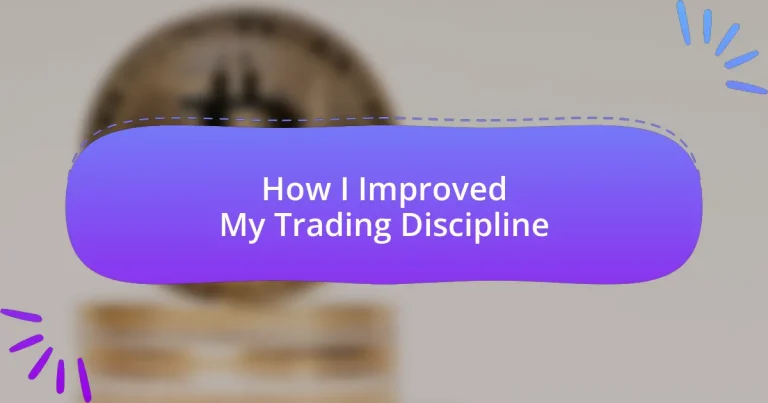Key takeaways:
- Trading discipline is crucial for success; it involves emotional control and adherence to a clear plan.
- Regular review sessions of trades can reveal patterns and enhance decision-making, turning mistakes into learning opportunities.
- Setting specific, measurable, and adaptable trading goals helps maintain focus and reduces impulsive actions.
- Self-accountability practices, such as writing down goals and asking oneself critical questions, strengthen discipline in trading.
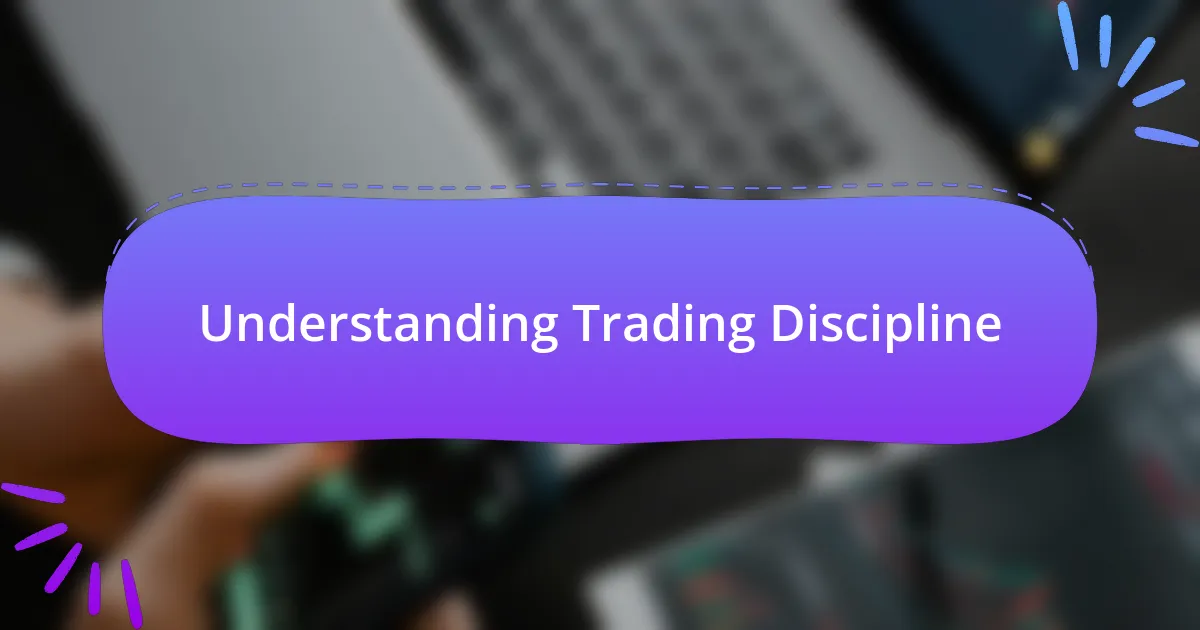
Understanding Trading Discipline
Trading discipline is the backbone of successful cryptocurrency trading, yet many traders overlook its significance. I remember a time when I impulsively bought into a coin, driven by the fear of missing out as its value skyrocketed. That experience left me with not just a financial loss, but a bruised sense of confidence. It made me question why I was involved in crypto trading in the first place.
When I finally took the time to understand what discipline meant in this context, it became clear that it was more than just sticking to my strategies. I realized it encompassed emotional control, patience, and the ability to step back from the chaos of volatile markets. Have you ever found yourself swayed by sudden market shifts? It’s a common pitfall, and recognizing it is the first step toward developing a steadfast approach.
In my journey, I learned that setting clear rules and sticking to them transformed my trading mindset. Initially, I didn’t appreciate the power of a trading plan, but after too many restless nights worrying about decisions made in haste, I understood its value. Trading discipline isn’t just a skill; it’s an emotional anchor that keeps your decisions aligned with your strategy and goals. Can you relate to the weight of that realization? It’s profound when you realize that your mindset is often your biggest hurdle.
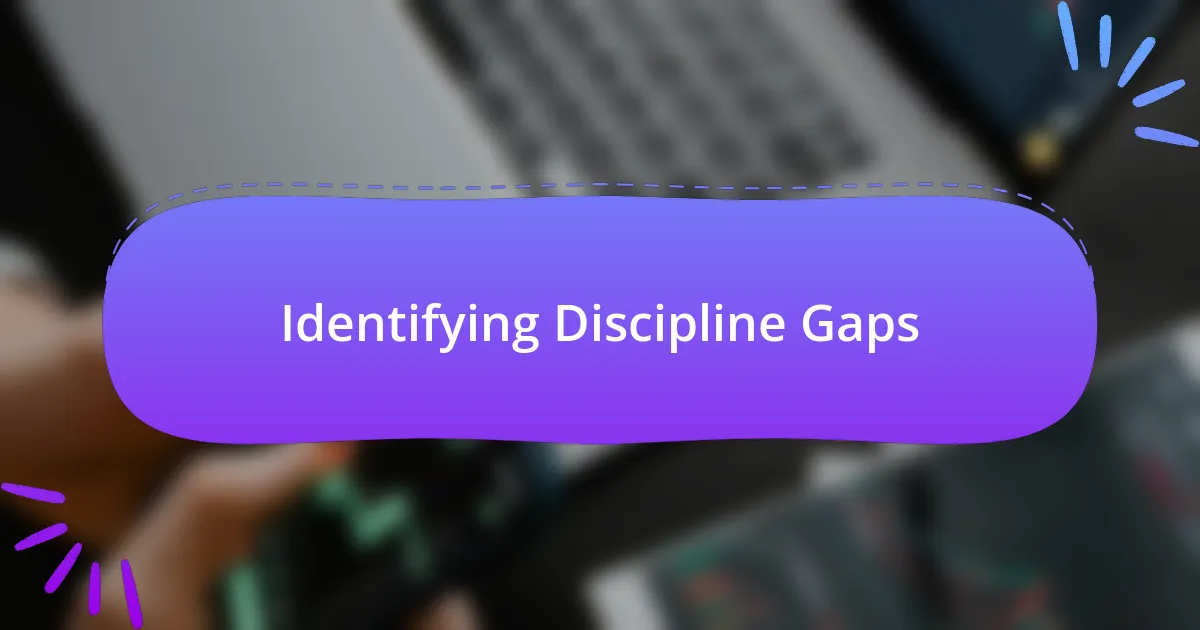
Identifying Discipline Gaps
Identifying discipline gaps in cryptocurrency trading can be a revealing process. I recall sitting down one evening, reviewing my trades. It struck me how often I deviated from my planned strategies; emotional decisions crept in under pressure. These moments highlighted not only where my discipline waned but also how my emotions dictated my actions far too often.
To pinpoint these gaps effectively, consider reflecting on these areas:
- Trade Journal Review: Regularly assess your trades to spot patterns in your decision-making.
- Emotional Triggers: Identify what triggers impulsive actions, such as fear or excitement.
- Rule Adherence: Evaluate how strictly you adhere to your trading plan and where you stray.
- Scenario Analysis: Analyze specific scenarios where you lost control—what led to those decisions?
- Feedback Loop: Create a system for feedback from trusted peers or mentors to gain an outside perspective.
Recognizing these gaps and understanding their origins can shine a light on the emotional landscape I had to navigate as a trader. It was an eye-opening experience that fueled my commitment to improving my discipline.
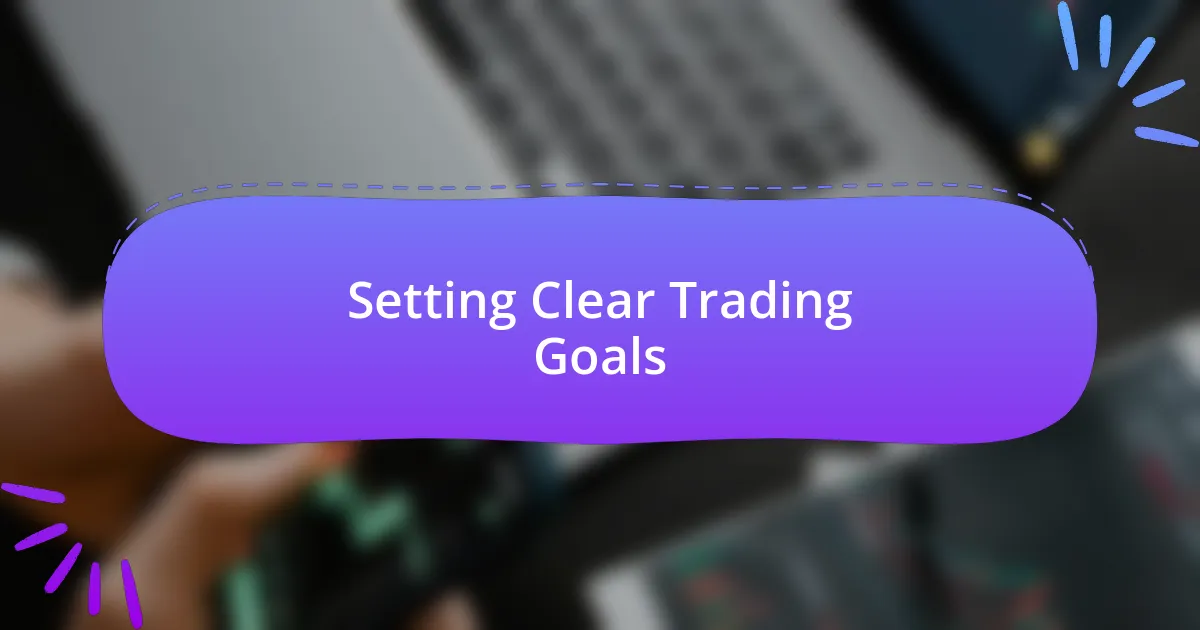
Setting Clear Trading Goals
When I started trading cryptocurrency, it became evident that setting clear goals was a game-changer for my discipline. Initially, my objectives were vague, leading to frustration and confusion. I vividly remember a time when I aimed simply to “make money,” which resulted in reckless trades driven by impulse rather than strategy. After re-evaluating my approach, I began to formulate specific, measurable goals that aligned with my overall trading philosophy and personal financial objectives.
In crafting my trading goals, I learned they should encompass both short-term and long-term visions. For instance, rather than just aiming for a specific profit target, I began setting goals like “achieve a 5% return this month” or “reduce my drawdown to below 10%.” These detailed targets helped me maintain focus and, importantly, kept my emotions in check. I found myself getting excited about the process rather than just the end result, which significantly reduced my stress levels.
In my journey, I also realized the importance of revisiting my goals regularly. The crypto market changes rapidly, and so do my circumstances. I remember a pivotal moment when I adjusted my goals after a poor trading month. By reflecting on what went wrong and realigning my expectations, I not only regained my confidence but also discovered new strategies that better suited my evolving trading style. Setting clear goals isn’t merely about aiming; it’s about adapting and growing.
| Goals | Description |
|---|---|
| Vague Goals | Aim to “make money” without a clear strategy. |
| Specific Goals | Set measurable targets like “achieve a 5% return this month.” |
| Adaptable Goals | Regularly revisit and adjust your goals as conditions change. |
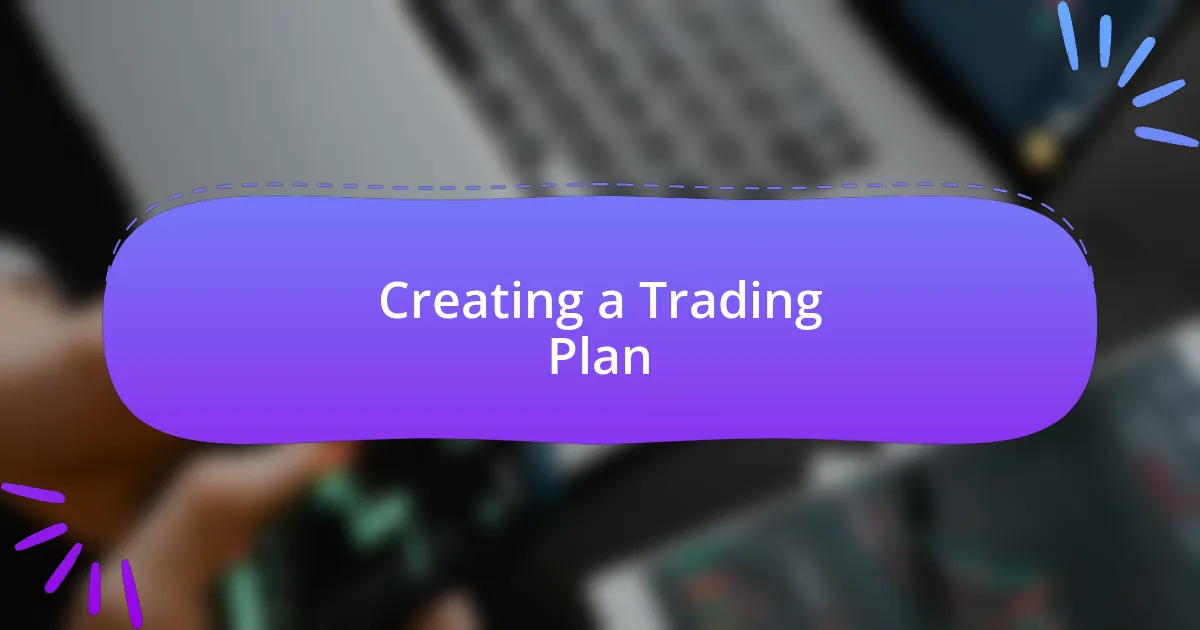
Creating a Trading Plan
Creating a Trading Plan is one of the most important steps in my journey as a cryptocurrency trader. I found that having a clear blueprint transformed my approach entirely. Just imagine waking up each day with a well-defined strategy rather than flying by the seat of my pants. It felt empowering.
I recall drafting my first trading plan and realizing how much I had overlooked. It wasn’t just about which coins to buy or sell; it encompassed risk management, entry and exit strategies, and even my emotional triggers. I specifically included a section detailing my risk tolerance. By thinking about how much I could afford to lose before placing a trade, I reduced my anxiety and sharpened my focus.
One of the most crucial elements in my trading plan was the incorporation of a review process. I consciously carved out time each week to analyze my trades and their outcomes. This led me to an enlightening discovery. I would often find patterns in my mistakes. For instance, I noticed that I tended to overtrade when I felt anxious, which pushed me to incorporate stricter criteria for entering trades. Reflecting on my performance helped me evolve not only as a trader but also as a person, reinforcing my commitment to discipline.
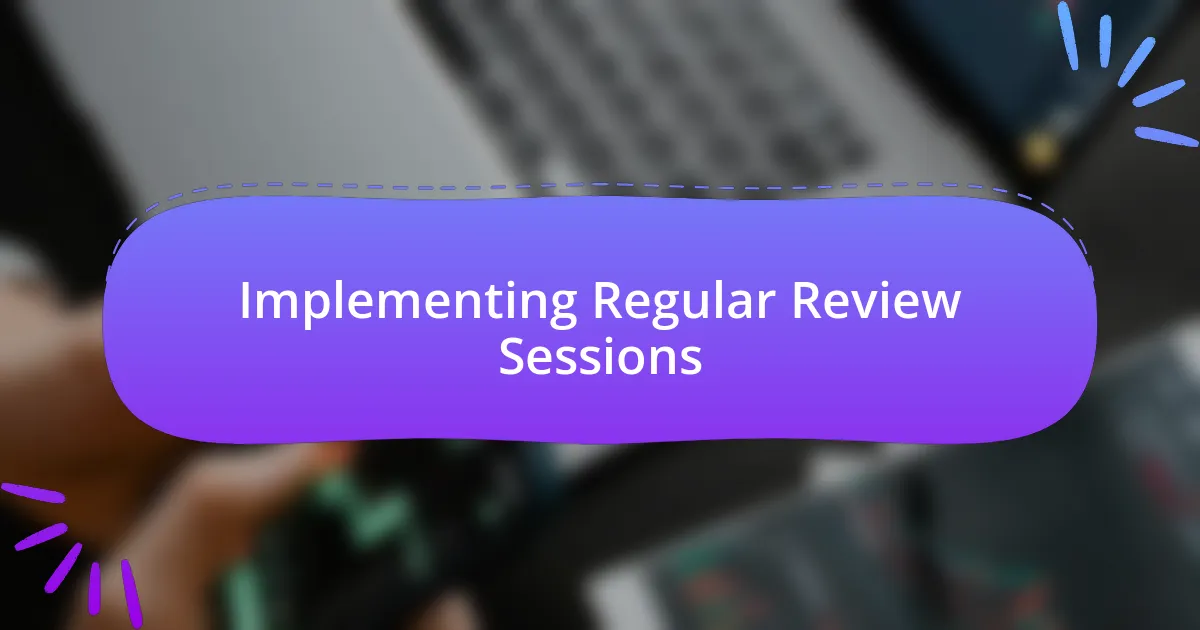
Implementing Regular Review Sessions
Establishing regular review sessions has been a game changer for my cryptocurrency trading discipline. Each week, I set aside time to examine my trades meticulously, and I’ve found this practice to be incredibly revealing. I often ask myself, “What could I have done differently?” This simple question opens the door to a wealth of insights, helping me understand not just the financial aspect but the emotional triggers behind my decisions.
In one memorable review session, I stumbled upon a pattern that shocked me. I realized I tended to avoid trades during periods of market volatility, motivated by fear rather than strategy. By identifying this trend, I was able to shift my mindset. I started to embrace volatility as an opportunity for growth, tweaking my strategies to align with my newfound understanding.
Moreover, framing these sessions as opportunities rather than chores has motivated me to adhere to them consistently. I remember the excitement I felt when I saw my decisions improve over time. It’s satisfying to see that the commitment to regular reviews not only enhanced my trading results but also reinforced the importance of self-reflection in my daily life. Have you ever considered how much you could grow just by taking time to look back and learn?
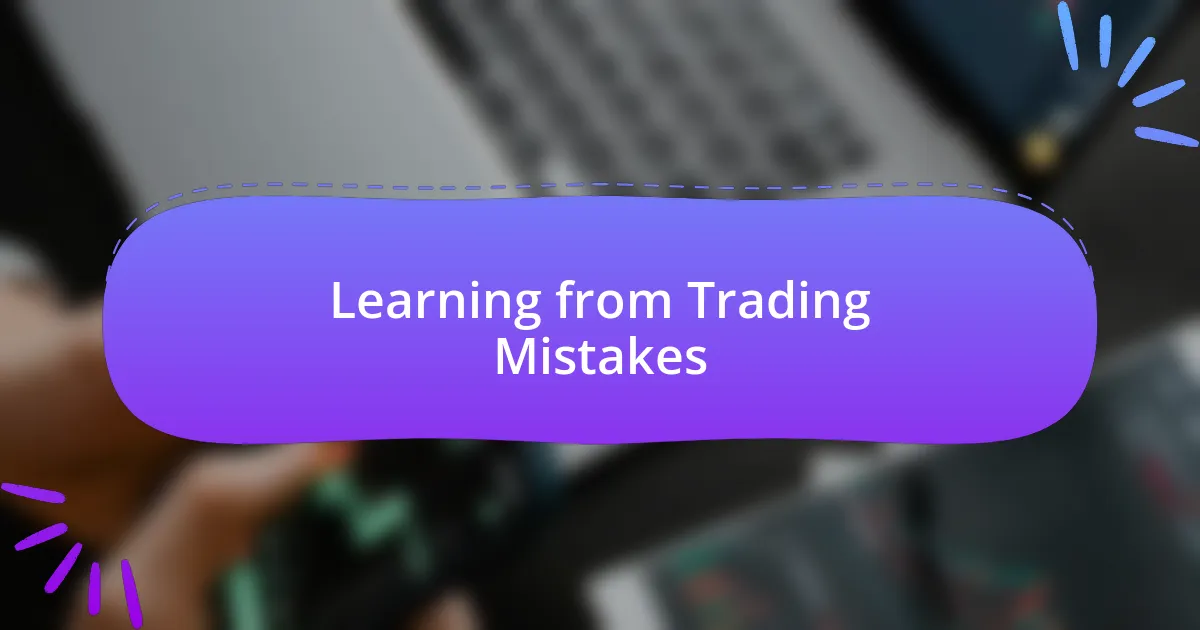
Learning from Trading Mistakes
Recognizing and analyzing my cryptocurrency trading mistakes has been pivotal in my journey toward better discipline. I vividly remember one particularly reckless trade I executed based on a rumor rather than solid analysis. When it turned sour, the sting of losing money was sharp, but what cut deeper was the realization that I had ignored my established strategy. Since then, I’ve embraced the mantra, “Every mistake is a lesson,” and this shift has reinforced my commitment to trading based on my own research and not external noise.
From my experience, documenting my errors has provided a roadmap for improvement. I created a simple trading journal where I jot down not only the details of each trade but also the emotions I felt during those crucial moments. This practice has illuminated patterns in my decision-making that I didn’t initially recognize. For instance, I discovered that I often rushed into trades when I felt overly confident, leading to avoidable losses. I find it fascinating to see how emotions can cloud judgment—have you ever noticed how your feelings impact your decisions?
Moreover, seeking feedback from fellow traders after a mistake has been a transformative experience. I remember sharing an error I made during an intense market downturn with a friend who had faced similar challenges. Hearing their perspective not only eased my frustration but also provided strategies I hadn’t considered before. Engaging in conversations about mistakes can turn a solitary learning experience into a collaborative growth opportunity. How do you approach discussing your trading errors?
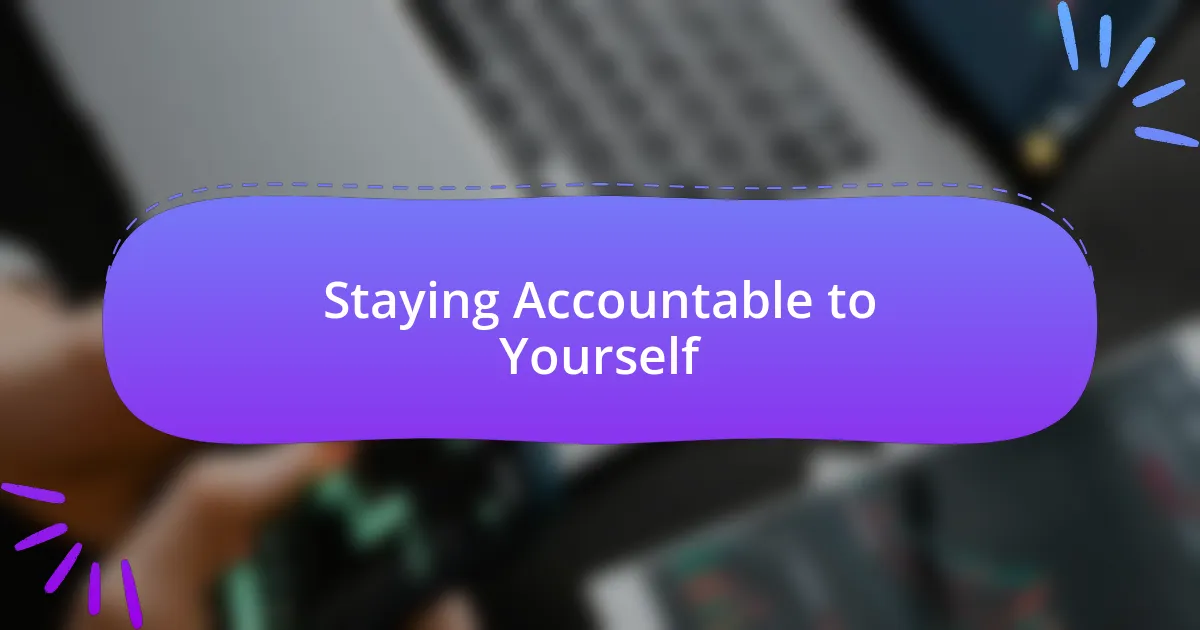
Staying Accountable to Yourself
Staying accountable to yourself in cryptocurrency trading can be a real game-changer. I discovered this truth one day when I set my trading goals and wrote them down. By committing my intentions to paper, I found it much harder to stray from them. Have you ever tried holding yourself accountable in such a tangible way? It’s eye-opening to see how writing down your goals makes them feel more like a commitment rather than just a passing thought.
In my early trading days, I took a lot of impulsive actions. I remember one night when I made three trades in quick succession, ignoring my budget constraints. The next morning, staring at my screen, I felt that familiar pit in my stomach as I reviewed the consequences. This experience taught me the importance of setting clear boundaries and checking in with myself regularly. Keeping a checklist of my rules helps me stay grounded. It’s funny how something so simple can bring such clarity, right?
Ultimately, I’ve realized that talking to myself can be a powerful form of self-accountability. During moments of uncertainty, I often pause and ask myself critical questions like, “Is this trade in line with my strategy?” or “What’s the real reason I’m entering this position?” This habit not only calms my racing thoughts but also reinforces my discipline. Can you remember the last time you had an honest conversation with yourself about your trading decisions? Reflecting on those moments can reveal patterns that might be holding you back.













